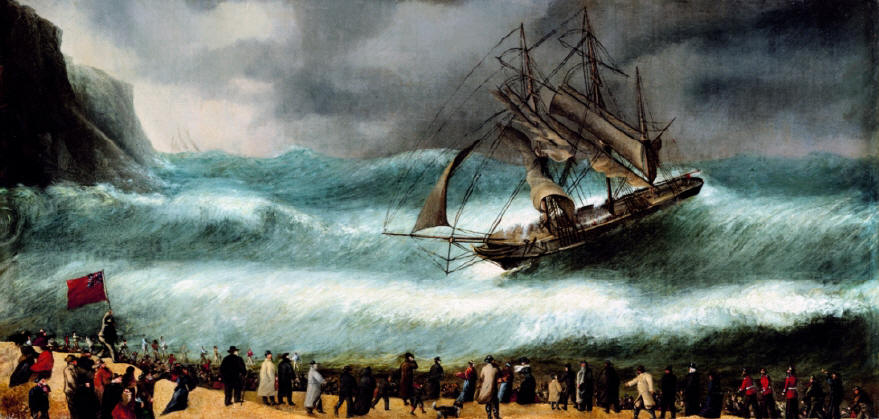
The Marie Reine was a French Barque wrecked on the Chesil Beach, Portland on the 24th January, 1875. The details of this tragic event were recorded in The Penny Illustrated Paper & The Southern Times.
The oil painting above (Picture 1), was painted by a very talented Portland artist by the name of Charles White. It was given to a Mr Richard Cox (Senior) who is one on the bystanders shown witnessing the wreck. What makes the painting so interesting, particularly for Portland & Weymouth is the fact that the artist provided a sketch/key to go with the picture, detailing the names of twenty-six of the bystanders. The painting passed to Mr Cox’s son, also a Richard, and appears to have remained in the family until June 1972. It was purchased for the Cove Inn, Chesil Beach, Portland by The Devenish Weymouth Brewery Limited.
It was acquired from a Mr R Cox and Mrs W Salmon (nee Cox), whose grandfather was Mr R Cox and is No.19 in the painting, and great great grandfather Mr R Cox (Senior) who is No. 23 in the painting. The painting and the sketch were displayed in the pub until 1989 when the pub was badly damaged by flooding. Both the painting and the sketch were thrown into a builders skip where they were recovered by their present owner, Mr Mark Coleman.
In 2009 a second painting by the same artist was discovered in the archive of Portland Museum. This painting shows the scene a little later on during the rescue. Details of this picture are recorded in Picture No. 2; the original of which can be seen in the Maritime Room of Portland Museum.
Times: 25 January, 1875.
“A heavy gale from the southwest commenced in London early yesterday morning, and continued for several hours. The greatest force of the wind was attained about 5 o’clock am, when it blew a hurricane. In the evening there were very frequent flashes of sheet lightning. As usual, considerable damage had been done to house property, but as yet no serious results to persons have been reported. Yesterday afternoon at 2 o’clock there was a terrific storm at Portland, accompanied by thunder and lightning. About that time the bark MARIE REINE, Captain DURAND was observed about two miles off the Chesil Beach, trying to run down westward, but after going a mile the Captain had to wear the ship. In doing so most of the canvas split, and the ship drifted towards the beach. For an hour or more the Captain used every exertion to weather Portland Bill, but without avail. Finding it would be impossible to get out of the bay, he backed the yards, and while it was daylight determined to try to beach the ship. He selected as the place Chesil Cove, and ran her aground within about 30 yards from the beach. Shortly afterwards a rocket was fired by the Coastguard, but it missed the mark. Before this was discharged two of the crew of the ship, thinking they could save themselves, got down the side and were washed away by the surf. The sea broke with such force against the ship as at times to cover her topmasts. The line from the second rocket fell on the end of the jib boom, and a Lascar at the risk of his life, went out and pulled it on deck. The crew did not understand how to manage the life apparatus; they made fast the line, and instead of pulling the cradle on board, several of them attempted to make their escape by crawling hand over hand on it. The Lascar, who was one of these, had a wonderful escape. He was washed off the rope, and almost carried round the bows of the ship, but was caught by another wave and actually brought to the line again, when some of the Portlanders with life lines around them rushed into the trough of the sea and rescued him. One of the Portland men rushed into the surf after another of the crew and a wave came and carried them away. It was thought they were drowned, but on the sea coming in again they were found clinging to each other, and several Coastguards rushed in and brought them ashore. By signals from the Coastguard on the beach, the Frenchmen were made to understand how to rig the rocket apparatus, and as soon as this was accomplished the cradle was slipped, and the remainder of the crew, with the exception of the Captain, brought safely on shore. It appeared the unfortunate Captain a short time previous, had one of his arms broken by the falling of a spar, and was lashed to the mizzenmast. Almost as soon as the ship struck her ribs were stove in; her masts went by the board very quickly after the last person was saved, and in less that half an hour she was a complete wreck. The rescued men were taken to the Cove Inn. The ship left Dunkirk about 12 days ago for Senegal with coal. The Portland men risked their own lives to save those of the shipwrecked men. A schooner was also in the bay at the time, but she managed to weather Portland Bill. A large number of ships afterwards sought refuge within the breakwater.”
600 ton French Barque, wrecked 1875 on Chesil Beach – (Complete story by Ed Cumming Interactive CD available from Portland Museum) Rocket Apparatus managed to get a line across. Breeches Buoy also used. Refs. Southern Times: 30/01/1875; Illustrated Times: 30/01/1875? & Weymouth Library Pamphlet L.910.4.MA.9. Portland Museum No. 22. Times Report
Day of Loss: 24
Month of Loss: 1
Year of Loss: 1875
Longitude:
Latitude:
Approximate Depth:
